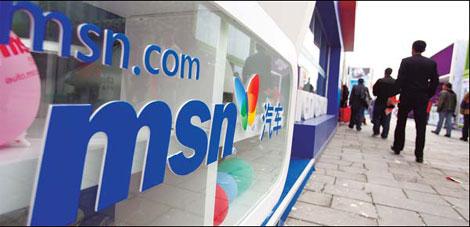
An advertisement for MSN China at an auto show in Beijing. MSN has teamed up with Chinese Internet portal Sina Corp, allowing Sina users to share their blogs or micro blogs with MSN users. [Photo: China Daily]
Microsoft's MSN China on Thursday signed an agreement with top Chinese portal Sina Corp, helping users of both companies to link their Internet accounts.
The move came four months before Microsoft was scheduled to shut down its Windows Live Spaces blogging and social networking service, a closure that is expected to affect about 1.5 million Chinese bloggers.
The partnership will help MSN China focus on its instant messaging service, of which the number of users has seen "dramatic growth" since a dispute between major Chinese Internet players Tencent and Qihoo 360 broke out, the company said.
MSN China, which runs Microsoft's Internet business in China, said it will integrate part of its online services including instant messaging, news portals and blogs with Sina.
That will allow users to post messages on Sina's micro blog service automatically on their Windows Live Messenger account, and log onto Sina's micro blog service with their Microsoft instant messaging account name, MSN China said.
Users of Microsoft's Windows Live Spaces blogging service on the Chinese mainland will also be able to transfer the contents of their accounts to Sina's blogging service, the company said.
"We did see a dramatic user growth in our messaging service after the disputes between Tencent and Qihoo 360," said Anderson Liu, general manager of MSN China. The company will focus more on its messaging services in China in the future, he said.
But Liu denied claims that the partnership with Sina was mainly due to the recent dispute between Tencent and Qihoo 360.
Internet consulting company iResearch said in October that there were 280 million people using instant messaging services. Tencent took more than 75 percent of the instant messaging market, while MSN China ranked second with 6.8 percent of the share and Sina's Sina UC took 1.1 percent.
Last week, Chinese Internet giant Tencent made an announcement that its popular instant messaging software, known as QQ, will not run on computers with Qihoo 360's anti-virus software. Qihoo 360 also accused Tencent of allowing QQ software to scan its users' computers for personal data.
The moves triggered heated discussion and dissatisfaction among Chinese Internet users, some of whom have turned to Tencent's rivals such as MSN China, Sina UC and China Mobile's Fetion services.
Liu said on Thursday that MSN China has paid much attention to protecting the privacy of its users. But he declined to give a specific target for MSN messenger's development plan in China and only said that "the choice lies in Chinese consumers' hands".
The Wall Street Journal said in a report on Oct 9 that users of Microsoft's messaging service had gone "from tens of thousands normally, to millions" a day since the flare-up between the two Chinese companies began, citing unnamed sources.
In addition to Sina and Microsoft's cooperation after the dispute, Chinese security software company Kingsoft and smaller player Keniu also announced a merger on Wednesday to fend off competition from Qihoo 360, which said it controls more than 70 percent of China's security market.
"Many companies may take action in the near future, but their impact on Tencent is limited to the short term," said Jake Li, analyst of Guotai Junan Securities.
Liu from MSN China also said that Microsoft is currently going through "the procedure to apply for an Internet mapping service license", which is required by the State Bureau of Surveying and Mapping.





